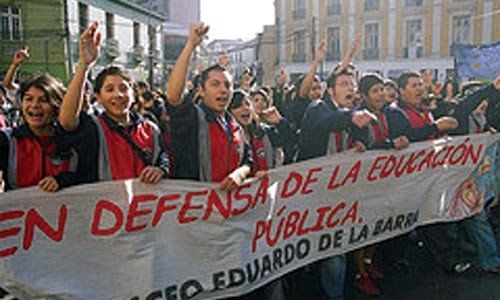Even on her first trip overseas -- just after her first time on an airplane -- and in a country where she didn't really speak the language, Corry Beth Vargo felt like she knew what she was shooting video about. After all, nobody expected much of the students at the all-girls' trade school in Valparaiso, Chile. Until pretty recently, Vargo had stood in something like their shoes.
The low expectations Vargo faced had something to do with her learning disability, which made reading and math difficult. College didn't seem an option; instead, Vargo studied commercial art at the Central Westmoreland Career and Technical Center. But Vargo kept pushing: She'd later study at community college, and that trip to Chile began three days after she earned a bachelor's degree in art from Robert Morris University.
On Tue., Sept. 11, the short documentary Vargo shot in Chile, "A Day of School," premieres at the Film Kitchen screening series. Also screening are another documentary short out of Robert Morris, Katie Lewandroski's "Sketch" (a portrait of an aspiring young Chilean artist), and three short comedies by Adam Taylor.
Vargo went to Chile in May 2006 as part of the Robert Morris Center for Documentary Production and Study's annual foreign-exchange trip. She wanted to shoot something about kids, and found her eventual subject only when a local contact suggested the trade school. "It was accidental, but it was the best thing that could have happened," says Vargo, who's 24.
The 28-minute "Day of School" depicts students learning such skills as cooking, sewing and running printing machines; a dissident teacher notes that critical thinking isn't in the curriculum. Things heat up when, by complete coincidence, young people mobilize nationally for the biggest student protest in Chilean history.
Vargo and her crew of two Chilean students -- her own Spanish-language skills are minimal -- captured the street action, meant to agitate for better education. But Vargo, whose freelance photography and videography work now supplements a department-store portrait-studio gig, was surprised not only by the protests, but by how passionately students desired better schools.
"Students don't care here [in the U.S.], and it's really sad, because they should," she says. In her early years of school, she admits, "I was one of the students who didn't care.'
Adam Taylor grew up in the South Hills, started shooting video with friends in high school, and went on to graduate, in 2001, from Pitt's film-studies program. All along, he's made movies, usually with a group of friends and family members who have evolved into a sort of repertory company of actors and crew. In 2004, his feature-length comedy titled Bundle of Joy even screened at the Appalachian Film Festival, in West Virginia.
In recent years, holding down a full-time job at a local audio-visual company, Taylor has leaned more toward short work. In August, his Galaxy454 team's short "Camp Lambda" won a few awards at the local installment of the international 48 Hour Film Festival. Like most of his work, "Camp Lambda" was a comedy.
At the Sept. 11 Film Kitchen, Taylor will showcase his iconoclastic, sometimes scatological sensibility with three other shorts. "Nuggets" is a rudely revisionist take on the Old West myth of the gold prospector; "Frank's Ark" updates the Old Testament to motorboat suburbia; and "Adam Taylor's Dracula" places a well-known character in a new line of work -- one involving a plunger.
Film Kitchen. 8 p.m. Tue., Sept. 11 (7 p.m. reception). Melwood Screening Room, 477 Melwood Ave., N. Oakland. $4. 412-316-3342, x178 or www.filmkitchenpgh.org














